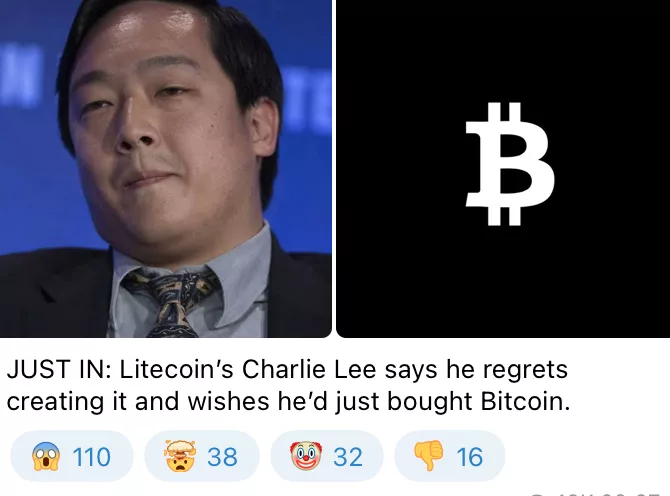Crypto Media Claims Charlie Lee Regrets Creating Litecoin: What Did He Really Say?
On the September 30 episode of the CoinDesk Spotlight podcast, Charlie Lee, the creator of Litecoin, shared insights about his journey in the crypto world. He reiterated his reasons for selling all of his litecoins in 2017 (offering nothing new to his earlier comments) and affirmed his strong belief in Bitcoin. Lee acknowledged that launching Litecoin brought him “a lot of headache” and didn’t result in significant financial gain. But did he express regret over its creation?
Summary
- Charlie Lee mentioned that he didn’t derive much profit from Litecoin.
- He advised his younger self to purchase Bitcoin, keep it safe, never sell, avoid anything related to crypto, and maintain anonymity.
- Some individuals interpreted his statement as an indication that he is indifferent to Litecoin, recalling that he liquidated his LTC assets in 2017.
Did Lee express regret over creating Litecoin?
During the latest episode of the CoinDesk Spotlight podcast, Lee discussed his passion for gold, his crypto odyssey, his time at Google, and, importantly, his feelings toward Litecoin and Bitcoin, the latter being his apparent main interest.
At the podcast’s conclusion, host Jennifer Sanasie queried Lee about advice he would give to his younger self. His response was:
“Buy Bitcoin, store it away, don’t sell anything, and don’t do anything else related to crypto, just sit on it and remain anonymous. That would be my advice […] Creating Litecoin didn’t really result in more money for me. It was a lot of headache […] if you just buy Bitcoin, keep it away, stay anonymous, hold it, don’t sell anything, it’ll be better off.”
Various media outlets covering cryptocurrency shared a portion of Lee’s reply, suggesting that he regrets creating Litecoin. Some posts were notably misleading. For example, the ChainDesk Telegram channel framed Lee’s comments as:
“Litecoin’s Charlie Lee says he regrets creating it and wishes he’d just bought Bitcoin.”

The post attracted over 13,000 views, but it significantly misrepresented what Charlie Lee conveyed during the podcast. While Lee acknowledged that developing Litecoin complicated his life, he does not separate himself from his creation and continues to devote much of his time to Litecoin.
In the same podcast episode, Lee highlighted his role as a director of the Litecoin Foundation, where he participates in weekly board meetings aimed at promoting Litecoin’s adoption.
Launched in 2011 as a Bitcoin fork designed to facilitate faster small transactions, Litecoin remains one of the top 30 cryptocurrencies by market capitalization. In August, public medical company MEI Pharma announced its pivot to Litecoin by acquiring 110.4 million in LTC. Luxxfolio also views Litecoin as a strategic asset.
On October 7, the Litecoin Twitter account humorously posted, “Thinking about changing my name to No Ragrets Coin.”
What does Lee actually regret?
However, when responding to the question about the advice he would give to his younger self, Lee emphasized another regret beyond launching Litecoin: his loss of anonymity. He reflected on this extensively, expressing envy for Satoshi Nakamoto’s anonymity and referring to it as “kind of powerful.”
When explaining to Sanasie why anonymity is significant to him and why he finds it unfortunate that he didn’t maintain it, Lee pointed out concerns regarding security:
“It’s essential because these days, you hear about a lot of issues like kidnappings and other threats, like the five-dollar wrench attack. It’s something that’s always on my mind.”
Why are some crypto enthusiasts upset with Lee?
While Charlie Lee is a prominent figure in the crypto community, his decisions and beliefs haven’t always garnered favor among LTC holders. In 2017, he drew attention by liquidating most of his Litecoin assets.
Lee clearly outlined his rationale: he viewed his LTC holdings as a potential conflict of interest and chose to sell them to avoid being influenced by price fluctuations while working on projects, making announcements, etc. Here’s how he summarized it in a Reddit post:
“Over the past year, I’ve tried to refrain from price-related tweets, but it’s challenging because price is such a crucial aspect of Litecoin’s growth. Whenever I tweet about Litecoin’s price or even just positive or negative news, I’m accused of doing it for personal gain. Some even insist I’m shorting LTC! So, in a sense, holding LTC and tweeting about it creates a conflict of interest for me due to my significant influence.”
Many were displeased with his move, believing that Lee cares little for Litecoin or that he values it less than fiat. One comment on Lee’s Reddit post reads:
“If you don’t believe in what you’re working on enough to hold a stake of your personal wealth in it, then I struggle to have faith in it as well.”
Eight years later, some individuals still view Lee as disingenuous and hypocritical despite his efforts to support Litecoin’s viability.
Whether or not one agrees with Lee, he maintains a unique voice in the crypto space, often making statements about his project that other founders and CEOs would find unthinkable. Some draw parallels between him and Elon Musk, but Lee differentiates himself by stating that, unlike Musk, who concentrates on boosting Tesla’s stock price, he is focused on the adoption of Litecoin. The resilience of the Litecoin community and the efforts of the Litecoin Foundation demonstrate that his words haven’t undermined Litecoin.

